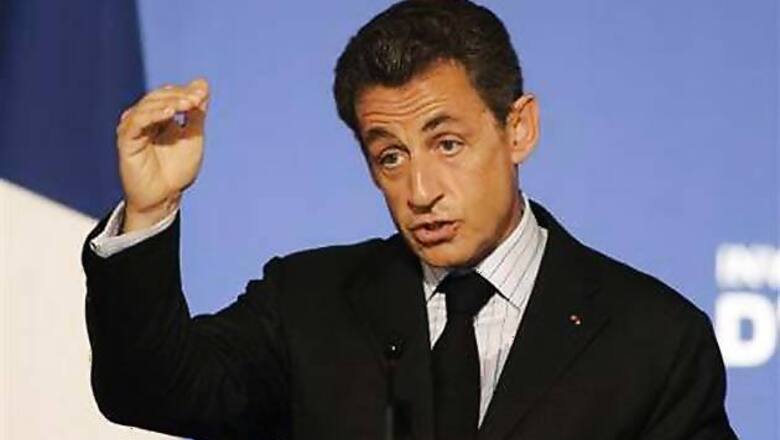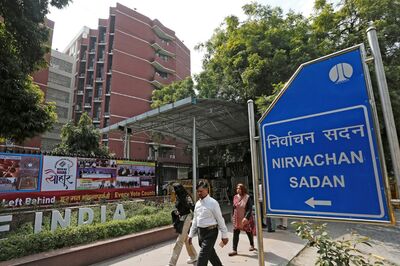
views
Paris: France votes on Sunday in round one of a presidential vote, with a feeble economy that could make Nicolas Sarkozy the country's first president to lose a fight for re-election in more than 30 years.
In a contest driven as much by a dislike of Sarkozy's showy style and his failure to bring down unemployment as by policy differences, Sarkozy and his Socialist rival Francois Hollande are pegged to beat eight other candidates to go through to a May 6 runoff, where polls give Hollande a double-digit lead.
Hollande, 57, promises less drastic spending cuts than Sarkozy and wants higher taxes on the wealthy to fund state-aided job creation, in particular a 75 per cent upper tax rate on income above 1 million euros.
He would become France's first left-wing president since Francois Mitterand, who beat incumbent Valery Giscard-d'Estaing in 1981.
Sarkozy, also 57, says he is a safer pair of hands for future economic turmoil but many of the workers and young voters drawn to his 2007 pledge of more pay for more work are deserting him as jobless claims have hit their highest level in 12 years.
Many French people also express a distaste for a president who has come to be seen as flashy following his highly publicised marriage to supermodel Carla Bruni early in his term, occasional rude outbursts in public and his chumminess with rich executives.
"We have to get rid of Sarkozy," said Marc Boitel, a trombone player taking part in a street protest ahead of Sunday's vote. "People just want jobs."
Boitel plans to vote for tub-thumbing radical leftist Jean-Luc Melenchon, who wants an anti-capitalist revolution, and then Hollande in round two, reflecting a voter shift that is unsettling some financial analysts as feeble growth threatens deficit targets in Europe's No 2 economy.
Still, Sarkozy is a more formidable campaigner than Hollande, who lacks sparkle.
The president's verve at the podium combined with his handling of a shooting drama in southwest France in March saw him claw back some ground in opinion polls last month. But he has since slipped back, leaving Hollande 10 or more points ahead in surveys for the deciding runoff.
Hollande is a whisker ahead for the first round, with an average 28 per cent support in polls to Sarkozy's 27 per cent. Both are far ahead of far-right leader Marine Le Pen, in third place at 16 per cent, who wants to curb immigration and take France out of the euro zone.
Melenchon, whose crowd-pulling charisma and clench-fisted vow to end the power of markets over national economies have made him a star of the election race, ranks fourth with 14 per cent, while centrist Francois Bayrou is fifth at 10 per cent.
Polls open at 8 am in mainland France and will close at 6 pm, staying open an extra two hours in big cities.
Markets fear Leftist agenda
Hollande, mindful of an upset in 2002 when far-right candidate Jean-Marie Le Pen knocked out Socialist Lionel Jospin in round one and a record high 28.4 per cent of voters stayed home, has urged supporters not to be complacent.
An April survey indicated turn-out could be even lower this year, with 32 per cent staying home, but most analysts doubt that.
The first votes began trickling in on Saturday as polls opened in overseas territories, including the north Atlantic islands of Saint Pierre and Miquelon off the coast of Canada.
The first official projections of the result, based on a partial count of ballots cast, will be released at 8 pm and the country's polling watchdog has threatened to punish any media breaking that embargo with fines and legal action.
A 1977 law bans the publication in France of early voting trends to avoid influencing late voters. During the last election, French voters hungry for information crashed the websites of several Swiss and Belgian newspapers.
The two main candidates carried their duel up until midnight on Friday, the deadline under a rule that bars campaigning on the weekend of the vote. They exchanged last-minute jibes mainly over their capabilities to manage the economy.
France is struggling with feeble economic growth, a gaping trade deficit, 10 per cent unemployment and strained public finances that prompted ratings agency Standard & Poor's to cut the country's triple-A credit rating in January.
Sarkozy has played up his credibility as an economic steward after he helped steer the euro zone through the worst of its crisis last year. Hollande has blamed him for the parlous state of France's public finances and for the rating downgrade.
Some investors see a risk that Hollande's focus on tax rises over spending cuts, his slower timetable for balancing the budget and his plan to raise taxation on the financial sector, could drive up French bond yields.
On Friday, the risk premium investors charge to hold French debt over safe-haven German bonds rose to nearly 1.50 per cent, betraying fears that Hollande's economic programme could be pulled to the left if Melenchon's popularity leads to a strong bloc of seats for the far left after parliamentary elections in June.




















Comments
0 comment